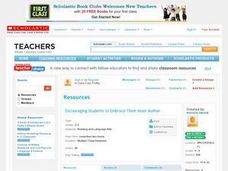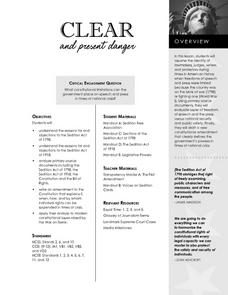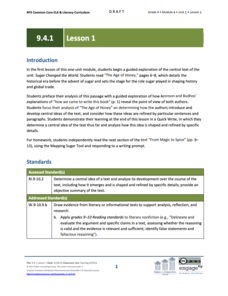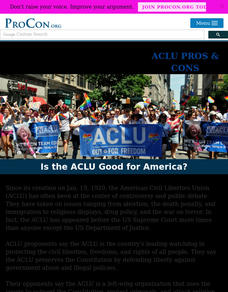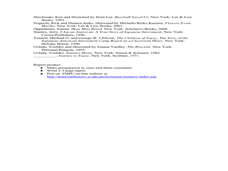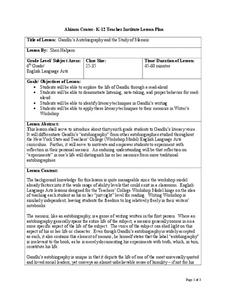Curated OER
Resources for Teaching Women Writers
Twelfth graders explore, discuss and experience a wide variety of texts from around the world written by women. They analyze the different genres covered and view a lot of unique point of views from different female perspectives. Topics...
Curated OER
Encouraging Students to Embrace Their Inner Author
Everyone is a writer! Youngsters compose an original piece of writing. In this writing lesson, they come up with their own idea for a piece of writing, revise it, and then publish it with illustrations. This lesson includes three...
Curated OER
Clear and Present Danger
Students assume identities of lawmakers, judges, writers, and protestors during times in American history when freedoms of speech and press were limited because country was on the brink of war or fighting one. Students use primary source...
K20 LEARN
Trigger Warnings - Intellectual Rights and Responsibilities: Banned Books, Censorship Part 1
"Warning: Conducting this lesson may be harmful." Such statements, called "Trigger Warnings," are the focus of a two-part lesson that looks at censorship, especially the pros and cons of trigger warnings. Class members read two articles,...
EngageNY
Grade 9 ELA Module 4, Unit 1, Lesson 24
Who bears the most responsibility for ensuring that goods are ethically produced? Using evidence drawn from Sugar Changed the World: A Story of Magic, Spice, Slavery, Freedom, and Science, the unit's central text, and from the...
K20 LEARN
The K20 Chronicle, Lesson 1: What Makes a Good Article?
Good news articles are engaging, informative, and often compelling. In the first lesson of the four-part series, young journalists analyze and evaluate news stories about former NBA player Enes Kanter Freedom. They learn about the...
Robert F. Kennedy Center for Justice and Human Rights
Vaclav Havel: Free Expression
Develop an understanding of universal human rights, particularly the freedom of expression, with the questions and activities that analyze the conflicts of Vaclav Havel. Learners define, interpret and rephrase the human rights article in...
Curated OER
"I Believe..." Podcast Style
Use this communication skills lesson to emphasize evaluating a speaker's main point and argument. After reading Martin Luther King's, "I Have a Dream Speech" and John F. Kennedy's speech, "I Believe in an America Where the Separation of...
Curated OER
Writing Newspaper Articles
Pupils write newspaper articles regarding their service learning experiences. In this writing skills lesson, students review the writing process skills to develop high-quality articles. Pupils write articles regarding the their acts of...
Curated OER
Women Writers and Dissent in 20th and 21st Century American Literature
Tenth graders read examples of writings by women authors showing their dissent. After completion of their reading, they brainstorm on why they believe female authors have criticized society. In groups, they use the Internet to research...
EngageNY
Grade 9 ELA Module 4, Unit 1, Lesson 1
How do writers introduce and develop the central ideas in a text? To answer this question, ninth graders closely examine "The Age of Honey," the opening chapter in Marc Aronson and Marina Budhos' Sugar Changed the World: A Story of...
PBS
Gloria Steinem’s Ancestry and Women’s Rights Movements: Lesson Plan | Finding Your Roots
Introduce class members to Presidential Medal of Freedom winner, activist, writer, and lecturer Gloria Steinem with a PBS resource that not only investigates Steinem's ancestry but also encourages learners to trace their own.
EngageNY
Grade 9 ELA Module 4, Unit 1, Lesson 23
In "How We Researched and Wrote this Book," the final essay in Sugar Changed the World: A Story of Magic, Spice, Slavery, Freedom, and Science, authors Aronson and Budhos discuss their research methods and purpose in writing the text....
Curated OER
ACLU
Is the American Civil Liberties Union (ACLU) good for America? The informative website is a one-stop shop for ACLU debate resources. Scholars read about the topics surrounding the issue, including free speech, national security, and...
Curated OER
Lesson III: Crisis, Pearl Harbor, Internment
The third in a series of lessons introduced by “A Fence Away From Freedom,” uses the Smithsonian website, “A More Perfect Union: Japanese Americans and the U.S. Constitution” and focuses on the section of the presentation devoted to the...
Roy Rosenzweig Center for History and New Media
Slaves and Indentured Servants
In theory, at least, indentured servitude and slavery were two different practices in the American colonies. Class groups conduct a close reading of two primary source documents, one written by a slave and one by an indentured servant,...
Curated OER
Gandhi's Autobiography and the Study of Memoir
Seventh graders explore the life of Gandhi using his autobiography and memoir. In this Gandhi exploration lesson, 7th graders analyze Gandhi's literary voice by reading his autobiography. Students identify literary techniques in Gandhi's...
Curated OER
Sojourner Truth
Students describe contributions made by Sojourner Truth and identify freedoms they enjoy because of the efforts of people like her. They define suffrage and abolition by experiencing it and by hearing an explanation of the definition.
Curated OER
Leaders in Journalism
Students examine the changing leadership roles and qualities of writers, journalists and editors in public life. They view short video clips by prominent journalists and read about various journalists in history.
Curated OER
Abraham Lincoln and Frederick Douglass: A Compare and Contrast Lesson Plan
Two great men, one time period, and one purpose; it sounds like a movie trailer, but it's not. It's a very good comparative analysis lesson plan focused on Abraham Lincoln and Frederick Douglass. Learners will research and read...
Indiana University
World Literature: "One Evening in the Rainy Season" Shi Zhecun
Did you know that modern Chinese literature “grew from the psychoanalytical theory of Sigmund Freud”? Designed for a world literature class, seniors are introduced to “One Evening in the Rainy Season,” Shi Zhecun’s stream of...
Curated OER
A Look at the History of Book Banning in America
Why do books end up on the banned book list? How do these banned books contribute to the literary canon? Start by showing the photo slide show, and discussing notably banned books. Then focus on some of the most popular objections:...
PBS
The History of Book Banning in America
Harry Potter, Are You There God? It's Me, Margaret, To Kill a Mockingbird. Kids view a slide show and then discuss the seven banned books featured in the presentation and the reasons why the books may have been banned.
Curated OER
Slave Narratives: Constructing U.S. History Through Analyzing Primary Sources
Learners access oral histories that contain slave narratives from the Library of Congress. They describe the lives of former slaves, sample varied individual experiences and make generalizations about their research in journal entries.
Other popular searches
- Freedom Writers Movie
- Freedom Writers Diary
- Freedom Writers Lesson Plans
- Freedom Writers the Movie
- Freedom Writers Movie Quiz
- Freedom Writers Movie Guide
- Freedom Writers Diary Movie
- Freedom Writers Film
- Freedom Writers Erin Gruel
- Freedom Writers Movie Plans
- The Freedom Writers Diary
- Freedom Writers Movie Lesson



